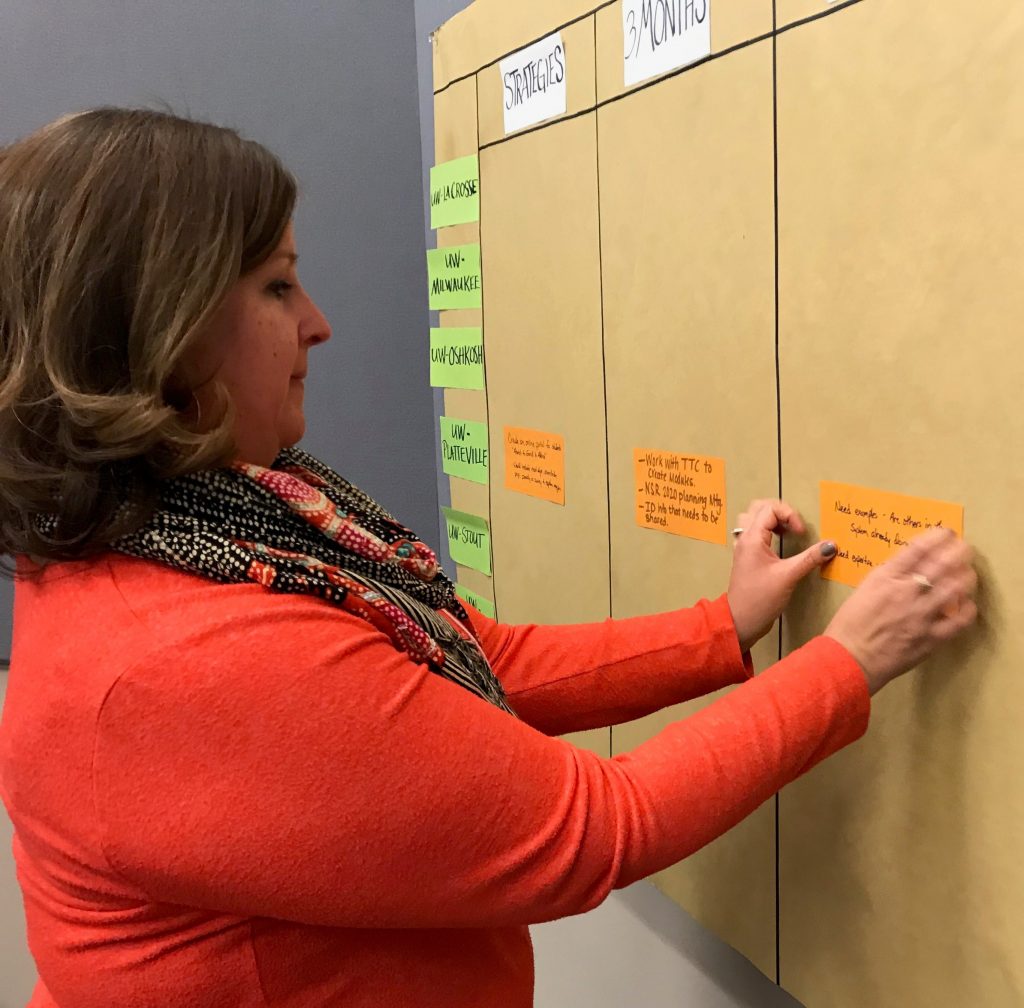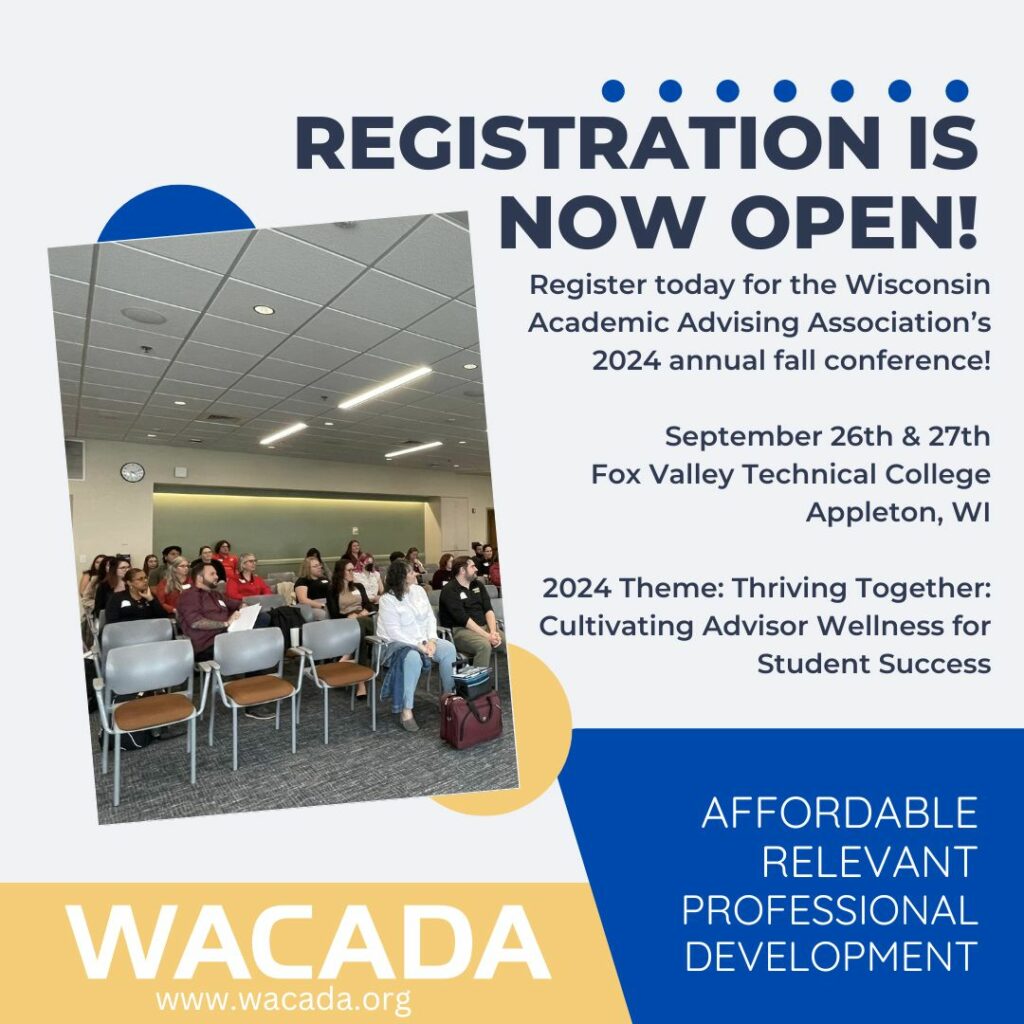Through WACADA, members have an opportunity to attend and engage in professional development opportunities they otherwise might not be able to attend or by helping in covering costs to make certain professional development opportunities a reality. Nichole Miller (University of Wisconsin-Eau Claire) and Kelsi Meyer (University of Wisconsin-Milwaukee) both received grants through WACADA to aid them in attending the NACADA Annual Conference in September and October of last year. Fortunately, they were both excited enough to recap their experiences in receiving a WACADA grant, their experiences at the NACADA Annual Conference, and what this professional development opportunity meant to each of them:
Nichole Miller (University of Wisconsin-Eau Claire):
Although I have worked in higher education for almost 12 years, I have only been in the advising field for a little over 2 years. My prior roles were administrative and did not allow for a lot of professional development opportunities. Once I started in academic advising, I was so excited about all of the different ways I could get involved and organizations to join! After all of these years, I had never been to a professional conference and I was thrilled to get the opportunity to go.
I began meeting with my Associate Director for advice (fellow WACADA winner – Angie Swenson-Holzinger!) as she has a lot of knowledge with grants and attending conferences. She assisted me with the grant process as well as helped me identify a budget to see to see how much financial support I would need to attend the NACADA Annual Conference. Between my department, our Office of Research and Sponsored Programs, and the Professional Development Grant from WACADA, I received enough assistance to go! Additionally, I was nominated and selected for an “Outstanding New Advisor in a Primary Role” certificate of merit and was invited to the scholarship ceremony the night before the conference began.
After attending the scholarship ceremony (which was amazing!), I began picking out the sessions I was going to attend and found that I was really interested in learning about advising different student populations: veteran, nontraditional, undeclared, and Generation Z students. I took detailed notes in many of the sessions as I wanted to bring the information back to the University of Wisconsin-Eau Claire to share with my colleagues. Specifically, a session that I attended about Veterans: “Serving Those Who Have Served: Strategies to Help Non-Veterans Effectively Assist Student Veterans” by Julie Traxler (Rutgers University) was really beneficial as I am the liaison with our Veterans Affairs office and was excited to gain more information about advising veteran students. The session provided useful information that our centralized advising structure could implement. Further, I connected with several veteran advisors across the country – so excited to collaborate with them in the future!
I recently held a “Lunch & Learn” meeting in our advising office to discuss the conference as well as provided a summary of several sessions that I attended. It was great to share and brainstorm with my colleagues! I highly recommend attending as there is so much to learn and bring back to your institution. Without the financial assistance I received, I would not have been able to attend – thank you so much, WACADA, for this opportunity.
Kelsi Meyer (University of Wisconsin-Milwaukee):
After my recent attendance to the NACADA Annual Conference in Phoenix, Arizona, I had some time to reflect on what my passions are within higher education.
During the conference, I heard many leaders from a variety of different campuses speak on new programs, systems, and platforms that are being used for advising. There are innovated ways to reach students and help them develop as a learner and as a professional. Many of these methods used quantitative data to support their claim such as student retention rates, graduation rates, diversity representation, and other statistics. I heard from Big Ten schools and how they collaborate with each other. There was a session that discussed how schools can better support graduate students.
So what’s next? I think it’s my turn to lead a presentation. Reflecting back, I think hearing from a recent undergraduate and new graduate student would be useful for advisors to hear first-hand experiences with campus climate. Milwaukee Institute of Art and Design (MIAD) is hosting the WACADA Winter Professional Development event coming up in February 2019. I am hoping to get my fellow classmates at UW-Milwaukee to host a presentation. That way, full-time administrators and staff can learn from a student perspective!
If you haven’t had the opportunity to attend a conference through WACADA or NACADA, I highly suggest it! This is a fun way to travel, meet new people, and grow in your profession. The Great Lakes Regional 5 conference is being held in Detroit, Michigan from March 13, 2019 to March 15, 2019. The call for proposals is open until October 29, 2018.
Also, none of this would have been possible if I had not used my funding sources; which included a grant from WACADA and a grant from my student organization, The Association for Student Affairs Professionals (ASAP). This is something I had to apply for. If you are no longer a student, there are grant opportunities through your university or college. Sometimes your employer will pay for mileage and meal reimbursement. Last, but not least, WACADA accepts grant applications for events like these! If you stay organized and know your options, going to a conference across the country will cost you little to nothing!
I hope to see everyone at MIAD in February!





About The Author: WACADA
More posts by WACADA